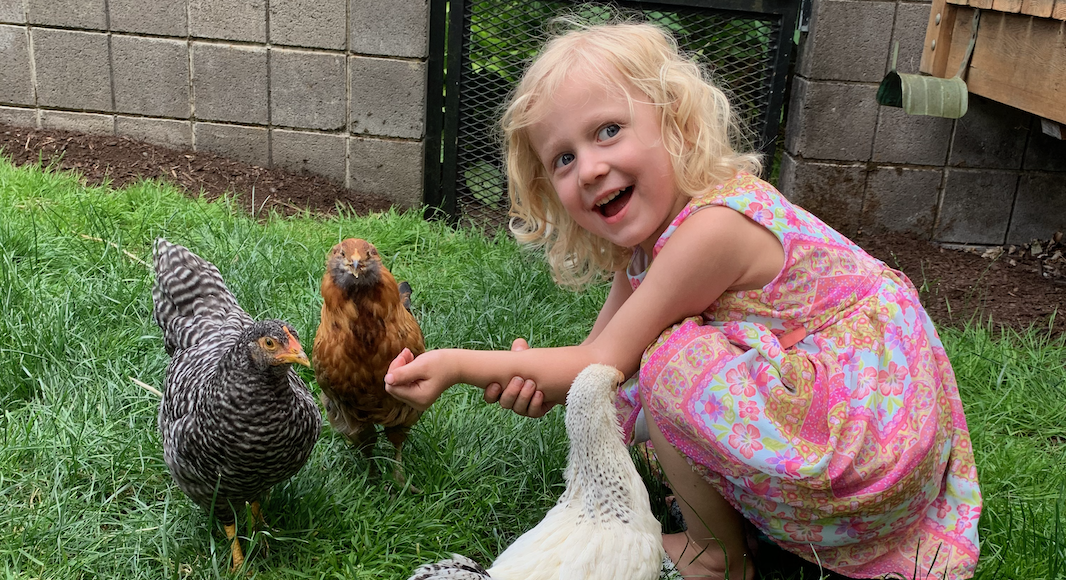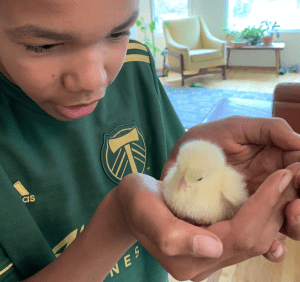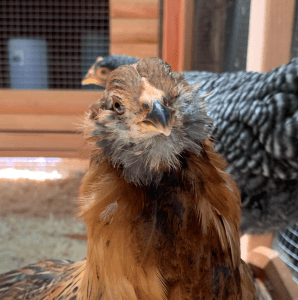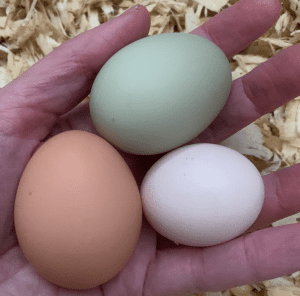For our family, one of the best things to come out of our early pandemic days was our foray into raising chickens. Not only do we now enjoy urban-fresh eggs on the regular, but our hens have provided a great hands-on and off-screen learning opportunity for our kids ever since we welcomed them into our home.
 The Portland backyard chicken scene experienced a boom at the time we jumped on the chicken bandwagon. Chickens are simple pets, relatively easy to take care of, and they happen to be hilarious. They pack a lot of personality into those wacky faces, and, for whatever reason, I find it soothing to watch them just wander around being… well, chickens.
The Portland backyard chicken scene experienced a boom at the time we jumped on the chicken bandwagon. Chickens are simple pets, relatively easy to take care of, and they happen to be hilarious. They pack a lot of personality into those wacky faces, and, for whatever reason, I find it soothing to watch them just wander around being… well, chickens.
Chicken stewardship had been on my radar for years before jumping on the bandwagon. I regularly proposed the idea to my husband, but, having grown up with hens himself, he was always less than enthusiastic. Fortunately, and he eventually agreed. That said, we did a lot of research prior to jumping in, so the decision was not one made without a solid foundation.
If you have considered raising backyard chickens, here’s how we got started.
First Things First: The Rules
Portland allows residents to raise up to three of any combination of the following without a permit: chickens, ducks, rabbits, pigeons, or pygmy goats. So, if you have already have two pygmy goats in your backyard, you can only add one chicken to your menagerie. Portland can be weird, it’s just that weirdness has limits when it comes to animal quantities.
Roosters are currently not permitted in PDX, which can be tricky if you are starting with chicks (see below). Read up on the Portland laws at portland.gov.
Surrounding cities have different rules; check out the specific guidance near you if you are not in within Portland city limits.
Get Your Timing Right
Looking into chickens early is a good start. If you want to start with baby chicks, springtime is the best season. You will need some time to prepare both your brain and your outdoor chicken haven.
A good place to dip your toes in is in any Facebook chicken group, at least while in the stage of casual research. I belong to several. Just scrolling through my feed for a few months helped me get familiar with some of the different options for setting up, feeding, and raising hens. It also warned me about some of the more common ailments and things to avoid. Seeing some of the difficulties that can arise ahead of time can help you decide if urban chickens are for you.
Somewhere in the process, I had a chat with my animal-obsessed child about the possibility of having chickens, and he was thrilled. I tasked him with the job of researching everything we needed, and taught him how to make a spreadsheet to share the results with me. Obviously, this won’t work if your child is four, but my kiddo was eight at the time and totally nailed it. Between his efforts and my review of them, we had a good idea of what we were getting into.
Decide If You Want Chicks or Pullets
 As mentioned, no roosters are allowed in PDX. Chicks are babies, and you often can’t tell their sex for several months, but they are soooo adorable. Pullets are young hens; you don’t get to raise them from babyhood, but they are guaranteed females. It’s up to you how old you want your chickens to be at the start of your journey.
As mentioned, no roosters are allowed in PDX. Chicks are babies, and you often can’t tell their sex for several months, but they are soooo adorable. Pullets are young hens; you don’t get to raise them from babyhood, but they are guaranteed females. It’s up to you how old you want your chickens to be at the start of your journey.
Admittedly, we did this part wrong. At the time, were told there was a rush on chicks in the PDX-area, and we were a bit behind the curve on availability. After finally agreeing to having chickens, my husband got a bee in his bonnet one day and went to our local feed store to get three chicks. I think he felt some sort of chicken pressure, and I agreed to go along with because I was stupid excited.
We knew at the time we were taking a chance, and, in hindsight, we would have done things differently. Some breeds are auto-sexed and, though not foolproof, you can end up with a higher chance of having a hen (something around 90%). A friend of mine went this route and she ended up with 3/3 chicks being hens. She was smart and waited out availability. We were not.
A few months later, when two of the chickens started blasting that unmistakable crow, I was heartbroken. Fortunately, I found someone locally with somewhat of a rooster sanctuary, so Ginsburg and DayTripper are now living out the rest of their days on a farm.
This left us in the unfortunate position of needing to find companions for our now lone hen, Rainbow. By this point, she was around 10 weeks old, and I wanted to find some pullets near her age. This being Portland, it was easy enough to find two new girls who were just a few days younger than Rainbow, and we welcomed Gray and Hawk to the family.
Home Sweet Home
When it comes to housing, chicks and chickens need different things. Chicks require more attention, and they need something to keep their living quarters warm. Many set up a cardboard box indoors with a heating lamp, which can be a bit of a fire hazard, but is ultimately the route we took. Read up on how to ensure you are using your heating lamp safely.
Grown chickens are easier: they need an area for sleeping, protected from the elements, and nesting boxes for laying. You want to be able to easily access the eggs and to clean out their poop without difficulty. Chickens poop so very much. Poop, everywhere. All the time, poop.
Other than those parameters, you can be as simple or as ornate as you like; we went somewhere in between. We purchased a small, waterproof coop for them to sleep in (available at a lot of local feed stores and online), and then built a whimsical DIY structure for protected daytime roaming and roosting. Our birds can’t free range, but we let them out regularly to wander around the yard with our surveillance.
Food, Water, Care
 My hens eat mostly commercial feed, with random chicken-appropriate scraps thrown in. I also supplement their food with oyster shells, which strengthens their eggs. They love grubs and oats as treats, and I’ll admit that I enjoy spoiling them. I visit them every day and replenish the food, refresh the water, clean up their poop (I repeat: lots of poop), and talk to them a bit. Two of them talk back, and one just gives me constant side eye. We’re cool, though.
My hens eat mostly commercial feed, with random chicken-appropriate scraps thrown in. I also supplement their food with oyster shells, which strengthens their eggs. They love grubs and oats as treats, and I’ll admit that I enjoy spoiling them. I visit them every day and replenish the food, refresh the water, clean up their poop (I repeat: lots of poop), and talk to them a bit. Two of them talk back, and one just gives me constant side eye. We’re cool, though.
It’s important to note that sanitation matters quite a bit with chickens, so I have dedicated shoes I wear only in the coop and never indoors. I also wash my hands after touching the chickens, their eggs, or any of their bedding. I do a pretty deep clean of the coop once every 7-10 days; I try to choose a non-rainy day for that so they can wander around the yard comfortably while I fluff up their living quarters.
The First Egg
 When the hens finally start laying, it can be exhilarating, especially when you have put a lot of time, money, and mental space towards making the whole chicken thing a go. It can take anywhere from 16-25 weeks for a hen to start laying, and their habits may be affected by health, age, breed, and the amount of sunlight. My hens have definitely slow down or completely stop in winter, but we get a consistent 2-3 eggs per day during laying season. This is plenty to feed our family of six. Because our hens are different breeds, they lay very different eggs, so it’s helpful to know who is laying and who isn’t on any given day.
When the hens finally start laying, it can be exhilarating, especially when you have put a lot of time, money, and mental space towards making the whole chicken thing a go. It can take anywhere from 16-25 weeks for a hen to start laying, and their habits may be affected by health, age, breed, and the amount of sunlight. My hens have definitely slow down or completely stop in winter, but we get a consistent 2-3 eggs per day during laying season. This is plenty to feed our family of six. Because our hens are different breeds, they lay very different eggs, so it’s helpful to know who is laying and who isn’t on any given day.
It’s not hard to fall in love with the wild world of poultry to discover you are a chicken lady at heart. Our birds have given my family a lot of joy — and some delicious eggs, to boot!
Local Resources
Linnton Feed and Seed
Coastal Farm and Ranch
Burns Feed Store


















